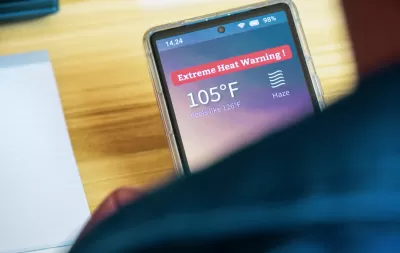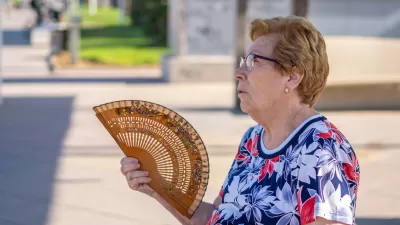Experts are urging cities and counties to develop heat action plans and personalized heat warnings as extreme heat becomes a leading cause of climate-related deaths.

As extreme heat continues to be the leading cause of climate-related deaths in the U.S., experts emphasize the need for improved tracking, response strategies, and community awareness. While the Centers for Disease Control (CDC) reported 2,300 heat-related deaths last year, studies suggest the actual toll may be much higher, with California among the hardest-hit states. Efforts are underway to create more effective heat warning systems, including a new pilot program in California aimed at improving the availability of real-time data on how heat affects individuals, potentially guiding more immediate protective measures in homes, schools, and workplaces.
Communities are exploring various strategies to combat extreme heat, such as planting more trees, increasing access to air conditioning, and establishing cooling centers. However, experts argue that more targeted information is needed to ensure people can make informed decisions about their exposure to heat. Researchers are now studying how individual physiological differences affect responses to heat, which could lead to personalized heat warnings. For example, mobile apps could provide tailored recommendations based on current weather conditions and personal health data to help individuals avoid dangerous heat exposure.
California has already begun implementing its Extreme Heat and Community Resilience Program, which allows local governments and organizations to apply for grants to develop cooling strategies such as increasing shade and making buildings more heat-reflective. In addition, UCLA's new Center for Heat Resilient Communities is spearheading efforts to develop a comprehensive blueprint for building heat-resilient communities. Over the next three years, the program will collaborate with 30 communities nationwide to field-test practical solutions, aiming to help local areas adapt to increasing heat risks and improve public health outcomes.
FULL STORY: Fall is here, but experts say communities need a heat plan

Alabama: Trump Terminates Settlements for Black Communities Harmed By Raw Sewage
Trump deemed the landmark civil rights agreement “illegal DEI and environmental justice policy.”

Study: Maui’s Plan to Convert Vacation Rentals to Long-Term Housing Could Cause Nearly $1 Billion Economic Loss
The plan would reduce visitor accommodation by 25% resulting in 1,900 jobs lost.

Planetizen Federal Action Tracker
A weekly monitor of how Trump’s orders and actions are impacting planners and planning in America.

Waymo Gets Permission to Map SF’s Market Street
If allowed to operate on the traffic-restricted street, Waymo’s autonomous taxis would have a leg up over ride-hailing competitors — and counter the city’s efforts to grow bike and pedestrian on the thoroughfare.

Parklet Symposium Highlights the Success of Shared Spaces
Parklets got a boost during the Covid-19 pandemic, when the concept was translated to outdoor dining programs that offered restaurants a lifeline during the shutdown.

Federal Homelessness Agency Places Entire Staff on Leave
The U.S. Interagency Council on Homelessness is the only federal agency dedicated to preventing and ending homelessness.
Urban Design for Planners 1: Software Tools
This six-course series explores essential urban design concepts using open source software and equips planners with the tools they need to participate fully in the urban design process.
Planning for Universal Design
Learn the tools for implementing Universal Design in planning regulations.
Caltrans
Smith Gee Studio
Institute for Housing and Urban Development Studies (IHS)
City of Grandview
Harvard GSD Executive Education
Toledo-Lucas County Plan Commissions
Salt Lake City
NYU Wagner Graduate School of Public Service





























